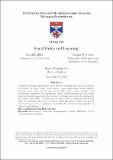Fiscal policy and learning
Abstract
Using the standard real business cycle model with lump-sum taxes, we analyze the impact of fiscal policy when agents form expectations using adaptive learning rather than rational expectations (RE). The output multipliers for government purchases are significantly higher under learning, and fall within empirical bounds reported in the literature (in sharp contrast to the implausibly low values under RE). Effectiveness of fiscal policy is demonstrated during times of economic stress like the recent Great Recession. Finally it is shown how learning can lead to dynamics empirically documented during episodes of "fiscal consolidations."
Citation
Mitra , K , Evans , G W & Honkapohja , S 2012 ' Fiscal policy and learning ' Centre for Dynamic Macroeconomic Analysis, Working Paper 1202 , University of St Andrews .
Type
Working or discussion paper
Collections
Items in the St Andrews Research Repository are protected by copyright, with all rights reserved, unless otherwise indicated.

